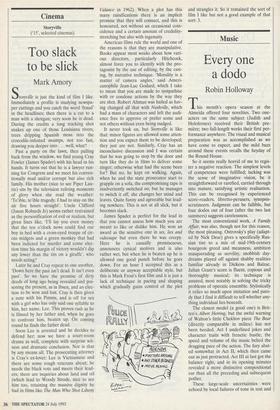Cinema
Storyville (`15', selected cinemas)
Too slack to be slick
Mark Amory
Storyville is just the kind of film I like. Immediately a profile is studying newspa- per cuttings and you catch the word 'fraud' in the headlines; then there is a cut to a man with a shotgun; very soon he is dead. During the credits a long tracking shot snakes up one of those Louisiana rivers, trees dripping Spanish moss into the crocodile-infested swamps, not too fast, drawing you deeper into . . . well, what?
Past a party on the lawn, then pulling back from the window, we find young Cray Fowler (James Spader) with his head in his hands. It turns out that he is a lawyer run- ning for Congress and we meet his conven- tionally mad and/or corrupt but also rich family. His mother (nice to see Piper Lau- rie) sits by the television reliving moments of glory when she read the weather: `Te'ible, te'ible tragedy. I had to stay on the air five hours straight'. Uncle Clifford (Jason Robards Jr) seems rather restrained as the personification of evil or realism, but given lines like, 'I'll lay you even money that the ten o'clock news could find our boy in bed with a cross-eyed troupe of cir- cus midgets and a green monkey that had been indicted for murder and come elec- tion time his margin of victory wouldn't dip any lower than the tits on a giraffe', who needs acting?
Later he and Cray repeat to one another, `Down here the past isn't dead. It isn't even past'. So we have the promise of dirty' deeds of long ago being revealed and poi- soning the present, as in Ibsen, and an elec- tion to be won and lost. Cray is then given a note with his Pimms, and is off for sex with a girl who has only said one syllable to him, her name, Lee. This proves rash as he is filmed by her father and, when he goes to confront him, beaten up. On coming round he finds the father dead.
Soon Lee is arrested and he decides to defend her; now we have a court-room drama as well, complete with surprise wit- ness and dramatic conclusion. Not is that by any means all. The prosecuting attorney is Cray's ex-lover; Lee is Vietnamese and there are some rough veterans about; he needs the black vote and meets their lead- ers; there are inquiries about land and oil (which lead to Woody Strode, nice to see him too, retaining the massive dignity he had in films like The Man Who Shot Liberty Valance in 1962). When a plot has this many ramifications there is an implicit promise that they will connect, and this is honoured, not without an occasional coin- cidence and a certain amount of credulity stretching but also with ingenuity.
American films rule the world and one of the reasons is that they are manipulative. Books appear most weeks about how vari- ous directors, particularly Hitchcock, almost force you to identify with the pro- tagonist by the use of editing, by the cast- ing, by narrative technique. 'Morality is a matter of camera angles,' said Ameri- canophile Jean-Luc Godard, which I take to mean that you are made to sympathise with or condone actions by the way they are shot. Robert Altman was hailed as hav- ing changed all that with Nashville, which had a mass of characters and left the audi- ence free to approve or prefer some and not others without even being nudged.
It never took on, but Storyville is like that: minor figures are allowed some atten- tion and you expect them to be developed; they just are not. Similarly, Cray has an inconclusive discussion and I was certain that he was going to stop by the door and turn like they do in films to deliver some zinger; otherwise what had the scene been for? But no, he kept on walking. Again, when he and the state prosecutor start to grapple on a sofa, the compromising tape is inadvertently switched on; but he manages to switch it off, she changes her mind and leaves. Quite funny and agreeable but lead- ing nowhere. This is not at all slick, but it becomes slack.
James Spader is perfect for the lead in that you cannot assess how much you are meant to like or dislike him. He won an award as the sensitive one in sex, lies and videotape but even there he was creepy. Here he is casually promiscuous, announces cynical motives and is also rather wet, but when he is beaten up he is allowed one good punch before he goes down. For an hour I accepted this as a deliberate or anyway acceptable style, but this is Mark Frost's first film and it is just a lack of technique in pacing and shaping which gradually gains control of the plot and strangles it. So it remained the sort of film I like but not a good example of that sort: 3.


















































 Previous page
Previous page